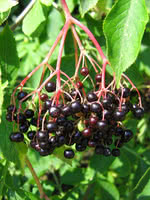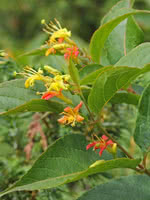Mon-Fri 9am - 5pm Mountain time
Black Elderberry vs Northern Bush Honeysuckle
Sambucus canadensis
Diervilla lonicera
NOT AVAILABLE THIS SEASON - MIGHT RETURN
NOT AVAILABLE THIS SEASON - MIGHT RETURN
Black Elderberry is a deciduous shrub native to eastern North America. You can plant this shrub in moist areas and it will help stabilize your soil. You can also use it on rural properties anywhere you'd use a lilac.
Black Elderberries are considered to be partially self-pollinating. So while they will still produce some berries without cross-pollination, planting with another variety will increase yields. Consider planting with Ranch Elderberry or Bob Gordon Elderberry.
Warning: the seeds, stems, leaves, roots, and uncooked berries of the Black Elderberry are poisonous to humans when eaten in quantity. You should cook the berries to make them safe for human consumption.
The Northern Bush Honeysuckle is a small, dense, deciduous shrub. The trumpet-like yellow flowers bloom late spring to early summer. Dark green leaves turn yellow then red in the fall. The flower nectar has a sweet honey taste that can be sucked out of the flower.
Because of its aggressive suckering habit, the Northern Bush Honeysuckle makes a great hedge, shrub border, or thicket in a woodland garden.
Black Elderberry Quick Facts
Northern Bush Honeysuckle Quick Facts
Toxicity: leaves, stems, and uncooked berries are poisonous to humans

